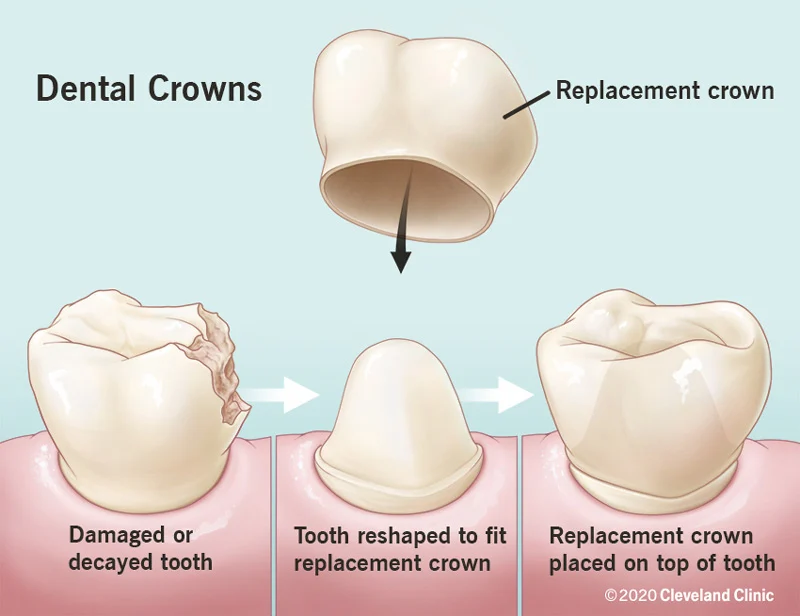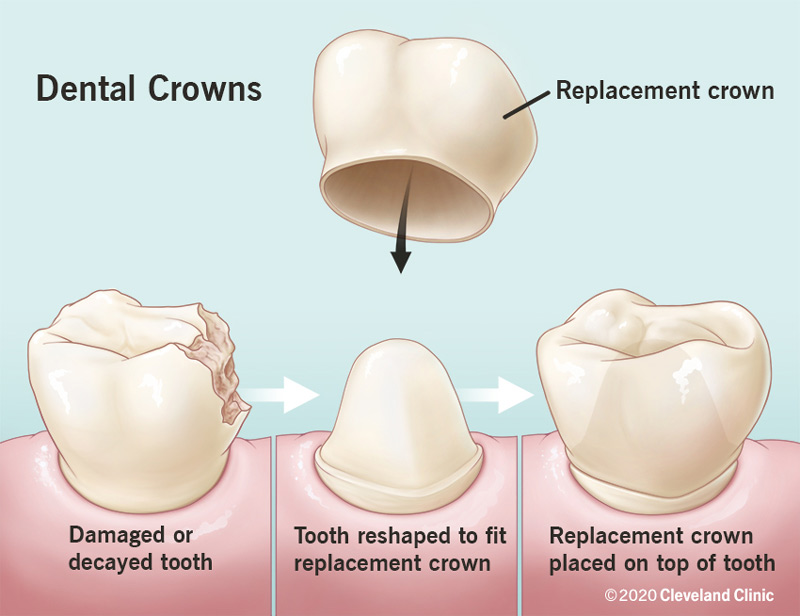
Dental crowns are a reliable option for tooth restoration, but their permanence is relative. While they’re designed to last long-term, they’re not considered permanent fixtures. Factors such as oral hygiene, biting forces, and the crown material influence their lifespan. With proper care, including regular dental check-ups and avoiding habits like teeth grinding, crowns can typically last between 5 to 15 years. However, individual experiences may vary, and some crowns may last even longer with diligent maintenance. It’s essential to follow your dentist’s advice for optimal care to ensure the longevity of your dental crowns.
Are Dental Crowns Permanent?
Dental crowns are a common dental procedure that is used to restore damaged or decayed teeth. They are designed to be durable and long-lasting, but many people wonder if they are truly permanent. In this article, we will explore the lifespan of dental crowns and discuss factors that can affect their longevity.
What Are Dental Crowns?
Dental crowns, also known as caps, are custom-made restorations that are placed over a tooth to restore its shape, size, strength, and appearance.
They are often used to protect a weak tooth, restore a broken tooth, cover a dental implant, or improve the appearance of a discolored or misshapen tooth.
The process of getting a dental crown involves several steps. First, the tooth is prepared by removing any decay or existing filling material. Then, an impression of the tooth is taken to create a custom-made crown that fits perfectly. While the permanent crown is being fabricated, a temporary crown is placed to protect the tooth. Once the permanent crown is ready, it is cemented onto the tooth using dental adhesive.
How Long Do Dental Crowns Last?
The lifespan of a dental crown depends on various factors, including the material used, oral hygiene practices, biting forces, and overall oral health. On average, dental crowns can last between 10 to 15 years. However, with proper care and maintenance, some crowns can last even longer.
Factors Affecting the Longevity of Dental Crowns
1. Material: Dental crowns can be made from different materials, including porcelain, ceramic, metal, or a combination of materials. Each material has its own advantages and disadvantages in terms of durability and aesthetics. Porcelain crowns are known for their natural appearance but may be more prone to chipping or cracking compared to metal crowns.
2. Oral Hygiene: Good oral hygiene practices, such as brushing twice a day, flossing daily, and regular dental check-ups, are essential for maintaining the longevity of dental crowns. Poor oral hygiene can lead to gum disease and decay, which can compromise the underlying tooth structure and affect the stability of the crown.
3. Biting Forces: Excessive grinding or clenching of teeth, known as bruxism, can put additional stress on dental crowns and may cause them to wear down or become loose over time. It is important to address any bruxism issues with your dentist to protect your dental restorations.
4. Oral Health: The overall health of your teeth and gums can impact the lifespan of dental crowns. If there are underlying dental issues, such as tooth decay or gum disease, it can weaken the tooth structure and compromise the stability of the crown.
Tips for Prolonging the Life of Dental Crowns
1. Maintain good oral hygiene by brushing twice a day with a soft-bristled toothbrush and fluoride toothpaste. Flossing daily and using an antimicrobial mouthwash can also help prevent gum disease and decay.
2. Avoid chewing on very hard objects, such as ice or pens, as they can cause damage to dental crowns. Similarly, avoid using your teeth to open packages or bite into hard foods.
3. Wear a mouthguard if you engage in activities that may increase the risk of dental trauma, such as contact sports.
4. Visit your dentist regularly for check-ups and professional cleanings. Your dentist can detect any issues with your dental crowns early on and provide necessary treatments.
In conclusion, while dental crowns are designed to be durable and long-lasting, they are not considered permanent. With proper care and maintenance, dental crowns can last for many years, providing you with a functional and aesthetically pleasing restoration. However, it is important to follow good oral hygiene practices and address any underlying dental issues to ensure the longevity of your dental crowns.
Key Takeaways: Are Dental Crowns Permanent?
- Dental crowns are designed to be a long-term solution for damaged teeth.
- With proper care and maintenance, dental crowns can last for many years.
- However, over time, dental crowns may need to be replaced due to wear and tear.
- Factors such as oral hygiene, diet, and habits like teeth grinding can affect the lifespan of dental crowns.
- Regular dental check-ups and good oral hygiene practices are essential to ensure the longevity of dental crowns.
Frequently Asked Questions
1. How long do dental crowns last?
Dental crowns are not considered permanent, but they can last for many years with proper care. The lifespan of a dental crown depends on various factors, including the material used, oral hygiene practices, and individual habits. On average, dental crowns can last between 5 to 15 years.
To increase the longevity of your dental crown, it is important to maintain good oral hygiene. This includes brushing twice a day, flossing daily, and visiting your dentist regularly for check-ups. Avoid chewing on hard objects or using your teeth to open packages, as this can cause damage to the crown.
2. Can dental crowns be replaced?
Yes, dental crowns can be replaced if necessary. Over time, a dental crown may wear down or become damaged, requiring replacement. Additionally, if the underlying tooth structure develops decay or other issues, the crown may need to be removed and replaced.
Your dentist will assess the condition of your dental crown during routine check-ups and determine if replacement is necessary. It is important to address any concerns or discomfort with your dental crown promptly to prevent further damage to the tooth or surrounding structures.
3. What can cause a dental crown to fail?
There are several factors that can contribute to the failure of a dental crown. Poor oral hygiene, such as inadequate brushing and flossing, can lead to decay or gum disease, which can weaken the tooth supporting the crown. Additionally, excessive biting forces or teeth grinding can cause the crown to crack or become loose.
Other factors that can cause a dental crown to fail include underlying tooth decay, trauma to the mouth, or an improper fit of the crown. Regular dental check-ups and maintaining good oral hygiene practices can help prevent these issues and prolong the lifespan of your dental crown.
4. Can a dental crown be repaired?
In some cases, a dental crown can be repaired instead of replaced. If the crown has minor damage or a small chip, your dentist may be able to repair it without the need for complete replacement. The repair process typically involves smoothing out rough edges or using dental bonding materials to fill in the damaged area.
However, if the damage to the crown is extensive or affects the structural integrity, replacement may be necessary. It is important to consult with your dentist to determine the best course of action for repairing or replacing a damaged dental crown.
5. Are there any risks associated with dental crowns?
While dental crowns are generally considered safe and effective, there are some risks associated with the procedure. These include potential allergic reactions to the materials used in the crown, tooth sensitivity after the crown placement, and the possibility of the crown becoming loose or falling off.
Additionally, the tooth supporting the crown may develop decay or other issues over time, requiring further dental treatment. It is important to discuss any concerns or risks with your dentist before undergoing a dental crown procedure.
Dental Crown Procedure at the Dentist
Final Thought: Are Dental Crowns Permanent?
When discussing dental crowns, their permanence is a common query. Although they’re designed for longevity, various factors like oral hygiene and diet influence their lifespan. Regular care, including brushing, flossing, and dental visits, is crucial for their maintenance. While not indestructible, with proper upkeep, crowns can endure for years, offering a durable dental solution.
Call or Book appointment online
:Ace Dental Care Alpharetta office: 678-562-1555 - Book Now
Ace Dental Care Norcross office: 770-806-1255 - Book Now
Disclaimer
This blog post was generated by artificial intelligence. The content of this post may not be accurate or complete, and should not be relied upon as a substitute for professional advice. If you have any questions about the content of this post, please contact us.
We are constantly working to improve the accuracy and quality of our AI-generated content. However, there may still be errors or inaccuracies. We apologize for any inconvenience this may cause.






